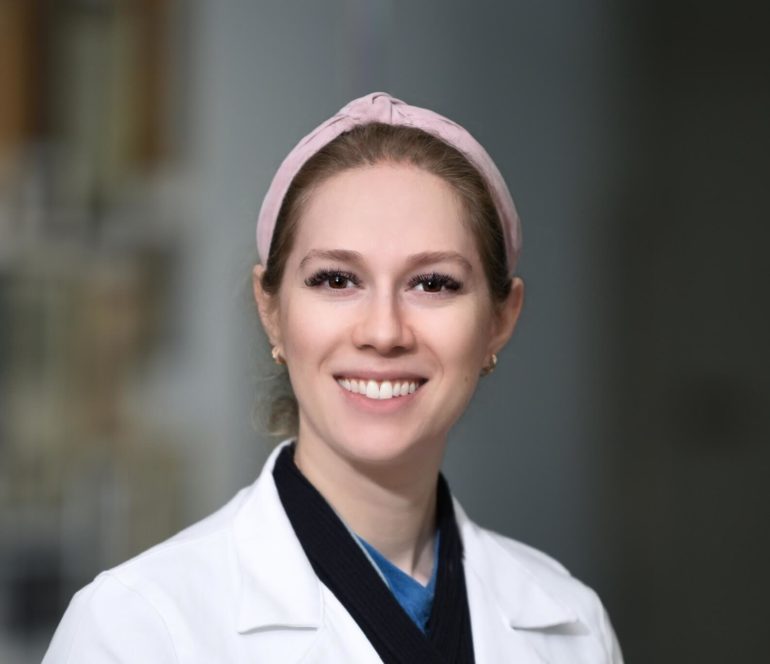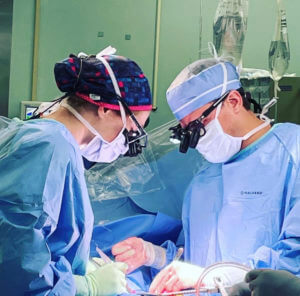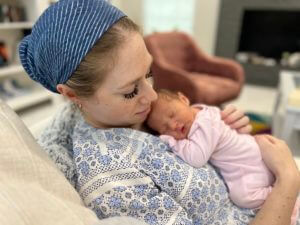
This Female Heart Surgeon is Also an Orthodox Jew
Orthodox women are often stereotyped as being nothing more than a slave to the household, relegated to standing in the back of a shul. The thing is, many Orthodox women take pride in the way they take care of the home, where they pray — and there are many that do so much in addition to that.
Dr. Perel Baral, 33, is one of them. She’s a cardiothoracic surgery fellow at Baylor College of Medicine, probably the only Orthodox Jewish woman (maybe even Orthodox Jewish person) in that position, her boss, Dr. Octavio Pajaro, Professor of Surgery and Associate Chief says.
“Heart surgery is at best ten percent women,” he explains. “I bet you she’s the only Jewish Orthodox heart surgeon in the United States…but even if she wasn’t an Orthodox Jew, she’s just an impressive person.”
 When you hear where Dr. Baral came from, it’s not surprising she has perseverance pumping through her veins. She was born in Chicago, the oldest of eight children. Her parents are both religious, but didn’t grow up that way — they chose it for themselves later in life. Her father was a software engineer who is now retired and her mother is actually a doctor in internal medicine as well.
When you hear where Dr. Baral came from, it’s not surprising she has perseverance pumping through her veins. She was born in Chicago, the oldest of eight children. Her parents are both religious, but didn’t grow up that way — they chose it for themselves later in life. Her father was a software engineer who is now retired and her mother is actually a doctor in internal medicine as well.
Dr. Baral explains that her mother actually grew up in Communist Russia, escaping in 1985. When she got to the U.S., no one would consider her doctor credentials. She needed to redo everything again, and she did. “I don’t think I could verbalize this as a child, but I internalized that there’s something very special about this profession if my mom was willing to go through this insane amount of training all over again in order to achieve her dream of becoming a doctor,” Dr. Baral shares.
At that point in her life, her mother was also starting a family and somehow making it all work. “She had her first four kids in residency,” Dr. Baral explains. “My grandparents told me stories about how breast pumps weren’t as widely available then, so my mom would run back and forth to nurse me while she was a resident. She was super dedicated.”
Dr. Baral would see her mother’s medical journals lying around and even read parts she could understand as a kid. As the oldest of all her siblings, she thought she would be a pediatrician since she was always helping to care for the younger set, but became fascinated with heart surgery a bit later on through watching reality shows about surgeons.
Meshing a Jewish Life with a Medical One

One of the reasons many Orthodox Jewish women don’t go into medicine is because of the demanding schedule it requires. For Dr. Baral, it has meant having to spend many a Shabbat in the hospital instead of home sipping on chicken soup. Dr. Baral completed medical school in Chicago at Midwestern University, then five years of general surgery residency at University of Kansas Medical Center then a three year fellowship at Baylor College of Medicine. She had her ups and downs with her Shabbos experience throughout all of that training.
“I knew I would have to work on Shabbos,” she says. “There’s no such thing as a shomer Shabbos residency.” That being said, her mother somehow managed to never work on Shabbos. “I never realized how difficult that is until I went into training myself,” she shares.
It’s not just about having time to rest. For Perel, it’s about missing out on the spirit of Shabbos and what that brings to her life. “It makes me really sad,” she says. “It’s the one time you have with your family and community and I feel a huge sense of loss having to miss out on it. It’s the best time to reconnect with my family and Judaism.”
Despite her sadness, Perel never complains, her boss Octavio (Dr. Pajaro) says. She may be missing out on something at home, but she is constantly thinking about her patients and their needs are her utmost priority.
One day, Dr. Pajaro explains she looked a bit upset after meeting with the team. “She said, ‘My head is going to explode because I’ve been trying for five hours to get a medication this patient needs and I can’t get it,’” he shares. “She did eventually get it. It was so amazing to see how much she cared about the patient’s suffering. Here’s a young doctor and surgeon who cares so intensely. She never lets go of that.”
It’s something that he says is rare actually to find in a doctor. “People do care, but they can unconsciously become less attentive to all the details,” he explains. “There are so many things in life that pull us away so even good people can become a little oblivious and not realize what is happening around them. Perel never is though. No matter how frustrating the system can be, she is consistently focused on caring for the patient.”
She’s someone who has her eyes set on the positive. Even when she’s in a new location, she gets close to others. During her residency in Kansas City, she said the community “adopted” her, and really welcomed her into their homes. “I could go there whenever I wanted,” she says. “I would go eat challah and pass out on the couch and they were totally fine with it. They were a huge source of support for me.”
It’s clear that even though her Judaism was challenged through her work, it also never wavered. “Non-negotiable is a good way to describe my Judaism,” she notes. “I had very positive emotions around it growing up. Shabbos, Yom Tov and keeping mitzvot are very important to me because I associate them with something very beautiful and strong.”
Despite her constant love for her faith, she also questioned things along the way, exploring and feeling things out until she nestled into her own place.
She went to Beis Yaakov as a kid, which is a very religious girls school. Then, she ended up dropping out of high school after junior year and lived in Panama for a semester, which is primarily a Sephardic community. “It gave me a different perspective,” she shares.
After her first year of college, she continued that exploration and went to Israel to study Arabic for five months, experiencing all different types of Judaism in the process. She took a course that was intended for men going into army intelligence so it was just her and 20 other 18-year-old guys, none of whom were observant in their Judaism. “I learned so much about how different Jews feel about their Judaism.” she says.
She has explored so much yet stays steadfast in who she is and what she wants. Some of that may have come from her upbringing and her mother’s wisdom. “My mom has been through so much adversity that I think she imbued all of us with a lot of grit,” she says. “She raised us very no-nonsense.”
Her mother also taught her how to be a kiddush Hashem, to be someone others like to be around so they’ll respect you and your religion as well.
Dr. Pajaro was instantly impressed by her openness. “She’s straight-forward and says what’s on her mind, but says it diplomatically,” he shares. “We spoke a lot about what we would fix in the healthcare system and what we can do to improve.”
It was this ability to speak her mind while doing so that left a strong first impression in his mind.
If we can glean anything from Dr. Baral’s story and the woman she is, it’s that stereotypes are just that, stereotypes. You can be anyone you want to be if you have the drive and passion to do so.
The Next Phase

Working insane hours as a doctor leaves little time for dating. Plus, when you’re living in a location with not many other religious Jews, the pool feels limited.
Many Orthodox Jews get married, or at least start dating, in their early 20s. Dr. Baral said she was so focused on becoming a doctor that she didn’t even start the process until she was about 25. “As residency was winding down, I realized I wanted to make this a big priority,” she shares. “My mom always told me, ‘If you focused on dating as much as you focused on being a surgeon, you’d be married with ten kids by now.”
So, Dr. Baral got to work, so to speak. She got on some dating apps, joined websites and ended up meeting her now-husband, Max, on a website called Saw You at Sinai (referencing the fact that all Jews were at Mt. Sinai together when we got the Torah). The website is made up of shadchans, or matchmakers, that set up different pairs. Max was close with a shadchan on the site who knew him well, and was the one who had the idea to set him up with Dr. Baral.
She was living in Houston at that point, in her first year of fellowship and Max was getting his MBA in Miami. “It was definitely hashgacha pratis (Divine intervention),” she says. She had a vacation scheduled to Israel in January 2022 — for doctors, vacations are scheduled very early on and you can’t change the dates you have. Then, Israel got shut down with the Omicron wave during Covid. What would have been a big disappointment ended up being the best thing that could have happened. She had just been set up with Max and thought that maybe it was G-d giving her the opportunity to go to Miami instead. She knew she had to take advantage of it.
Dr. Baral says they had a phone call before her visit and after that call, she just knew he was the one. There was no logical explanation, just a feeling — but she was right.
After dating a few times that week, they then did long distance after that. They got married in December of last year. Living in Houston, TX for two people who were raised in very Jewish areas — Chicago and New York — may seem like a huge adjustment, but both Dr. Baral and her husband are blown away by the community there. Between the generosity of their neighbors and the amount of religious life that exists, they are grateful they’ve been able to call it home.
They just welcomed a baby girl into that new home together named Reut Miriam, right before Rosh Hashanah. Reut is named for Max’s two grandmothers, both named Ruth and Miriam, Perel’s great grandmother.
Adjusting to motherhood is a challenge, even for a surgeon. “As much as I’ve accomplished and hope to continue to accomplish professionally, becoming a mother is at once even more stressful and more meaningful than all of that,” she shares. “Also, the sleep deprivation is worse with a newborn hands down.”
It’s just the next step on a journey to navigating a life between work, marriage, Judaism and now motherhood. Dr. Baral hopes to get an offer from the hospital she is at now and stay on staff.
“Not only is she trying to learn and understand how to be the stellar heart surgeon that she’s destined to be,” Dr. Pajaro says. “She’s also learning how to be a wife and how to stay true to her spiritual and religious beliefs as an Orthodox Jewish woman.”
“Good, intelligent people grow for a lifetime,” he continues. “She will figure out her path. She’s self-driven and a hard worker. I will help her do that as much as I can.”
If you found this content meaningful and want to help further our mission through our Keter, Makom, and Tikun branches, please consider becoming a Change Maker today.








4 comments
Sort by
Perel you’re truly an inspiration! Chani Feit
I can’t help saying a few more words about Dr. Baral.
In the story above regarding the late medication arrival, I want to point out how softly she told me how worried she was. I don think I conveyed that to the interviewer, (I’m not a good interviewee.) The intensity of her caring and her way of telling me, by whispering it, was quite moving. If one were to describe the ideal characteristics necessary to be a superb physician and an outstanding heart surgeon, Dr. Baral has them all, from the technical skills, the knowledge and the intellectual abilities to the deepest human qualities. Dr. Baral is a listener. Often, days or even weeks after I had said something in passing, she’d bring it up to show it in a different light. Dr. Baral let me show her how experience can be a great asset but she also showed me how a fresh view unencumbered by experience can be just as valuable. Dr. Baral remembers every important detail about each patient from their social support to the details about their medical history and every medication they are on. Dr. Baral can manage the sickest patients in the intensive care unit. Of course, she seeks advice and consults with everyone on the team but she drives the care. I saw her manage complicated critically-ill patients with the insight of an experienced critical care physician. Dr. Baral takes everything she’s taught, everything that’s passed on to her and makes it hers by bringing to it her values of what it means to be a profoundly good human being. From what I can see she’s done this all her life.
Thank you so very much for this profile. I was Dr Perel Baral’s father’s Chavrusah in Skokie Yeshiva for three years and am so delighted by this article. B’Simcha Rabbah.
Dr. Perel Baral’s journey is a powerful testament to breaking stereotypes surrounding Orthodox Jewish women. Her dedication to both her faith and her demanding career as a heart surgeon is truly inspiring. It’s refreshing to see such a nuanced portrayal that highlights the strength and resilience of women who navigate complex identities while making significant contributions to society. Thank you for sharing her story!